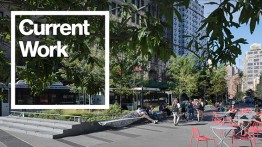Current Work | Accessible Streets
06/03/2024

This spring, the League is focusing on the imperative for more accessible spaces, from different perspectives and through different typologies. Following the lead of disability justice organizers to uplift intersectional approaches over notions of universality, our hope is to reach beyond the often inconsistently executed design ramifications of the Americans with Disabilities Act (ADA) to address how the fields that are charged with planning, design, construction, and management can more fully support the creation of an inclusive built environment.
As our streetscapes evolve to respond to pedestrianization, multimodal transit, outdoor dining, electric vehicles, and more, how do designers ensure that these layered interventions make streets more accessible for pedestrians, rather than obstruct their paths? Current Work: Accessible Streets will explore the changing profile of New York City’s streets on either side of the curb with a focus on mobility.
The evening will begin with a discussion between Claire Weisz and Adam Lubinsky of design firm WXY architecture + urban design and Edmund E. Asiedu, accessibility policy analyst and ADA Coordinator for the New York City Department of Transportation. The program will be moderated by Mariana Mogilevich, editor-in-chief of Urban Omnibus. After the panel concludes, attendees are invited to join WXY facilitators “on the street” for a workshop focused on sensory experiences of the urban landscape.
About WXY architecture + urban design
WXY architecture + urban design is a multidisciplinary practice centered on innovative approaches to public space, civic buildings, and urban issues. The New York City-based firm’s award-winning projects range from buildings such as the Spring Street Garage / Salt Shed to strategic and master plans such as the D15 Diversity Plan and the vision for Governor’s Island Climate Solution Center.
Panelists
Edmund E. Asiedu is an accessibility policy analyst and ADA coordinator for the New York City Department of Transportation. A disability rights advocate, he has held positions at Columbia University School of Public Health, the National Disability Rights Network, and the Ghana Society of the Physically Disabled Youth Wing.
Adam Lubinsky is a principal of WXY architecture +urban design. Focused on urban design, planning, and mobility, Lubinsky’s projects have included large-scale strategic and master plans with clients and collaborators that range from community development corporations to cultural institutions. He is an associate professor at Columbia University GSAPP.
Claire Weisz is a founding partner and principal of WXY architecture + urban design. Her work as an architect and urbanist focuses on public space, structures, and cities. In 2018, Weisz was awarded the Medal of Honor from AIANY and was honored with the Women in Architecture Award by Architectural Record in 2019.
Support
This program is supported, in part, by public funds from the New York City Department of Cultural Affairs in partnership with the City Council, and by the New York State Council on the Arts with the support of the Office of the Governor and the New York State Legislature.
The event is co-presented with The Architectural League of New York.




